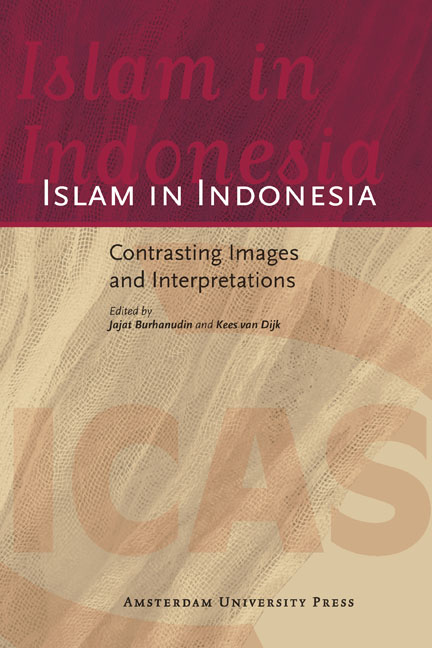Book contents
- Frontmatter
- Contents
- Introduction
- 1 Comparing Different streams of Islam: Wrestling with Words and Definitions
- 2 Defining Indonesian Islam: An Examination of the Construction of the National Islamic Identity of Traditionalist and Modernist Muslims
- 3 Indonesia in the Global Scheme of Islamic Things: Sustaining the Virtuous Circle of Education, Associations and Democracy
- 4 Distinguishing Indonesian Islam: Some Lessons to Learn
- 5 Islam, State and Society in Democratising Indonesia: A Historical Reflection
- 6 The Politics of Piety in the Pondok Pesantren Khusus Waria Al-Fattah Senin-Kamis Yogyakarta: Negotiating the Islamic Religious Embodiment
- 7 The Indonesian Muslim Feminist Reinterpretation of Inheritance
- 8 Managing Familial Issues: Unique Features of Legal Reform in Indonesia
- 9 A new Generation of Feminists within Traditional Islam: An Indonesian Exception
- 10 Religious Pluralism and Contested Religious Authority in Contemporary Indonesian Islam: A. Mustofa Bisri and Emha Ainun Nadjib
- 11 Islam and Humanitarian Affairs: The Middle Class and New Patterns of Social Activism
- 12 Dakwah radio in Surakarta: A Contest for Islamic Identity
- 13 Muslim Fundamentalism in Educational Institutions: A Case Study of Rohani Islam in High Schools in Cirebon
- 14 Majlis Tafsir Al-Qur’an and its Struggle for Islamic Reformism
- Glossary
- About the Editors and Contributors
- Bibliography
- Index
- Monographs
9 - A new Generation of Feminists within Traditional Islam: An Indonesian Exception
Published online by Cambridge University Press: 09 January 2021
- Frontmatter
- Contents
- Introduction
- 1 Comparing Different streams of Islam: Wrestling with Words and Definitions
- 2 Defining Indonesian Islam: An Examination of the Construction of the National Islamic Identity of Traditionalist and Modernist Muslims
- 3 Indonesia in the Global Scheme of Islamic Things: Sustaining the Virtuous Circle of Education, Associations and Democracy
- 4 Distinguishing Indonesian Islam: Some Lessons to Learn
- 5 Islam, State and Society in Democratising Indonesia: A Historical Reflection
- 6 The Politics of Piety in the Pondok Pesantren Khusus Waria Al-Fattah Senin-Kamis Yogyakarta: Negotiating the Islamic Religious Embodiment
- 7 The Indonesian Muslim Feminist Reinterpretation of Inheritance
- 8 Managing Familial Issues: Unique Features of Legal Reform in Indonesia
- 9 A new Generation of Feminists within Traditional Islam: An Indonesian Exception
- 10 Religious Pluralism and Contested Religious Authority in Contemporary Indonesian Islam: A. Mustofa Bisri and Emha Ainun Nadjib
- 11 Islam and Humanitarian Affairs: The Middle Class and New Patterns of Social Activism
- 12 Dakwah radio in Surakarta: A Contest for Islamic Identity
- 13 Muslim Fundamentalism in Educational Institutions: A Case Study of Rohani Islam in High Schools in Cirebon
- 14 Majlis Tafsir Al-Qur’an and its Struggle for Islamic Reformism
- Glossary
- About the Editors and Contributors
- Bibliography
- Index
- Monographs
Summary
Introduction
For nearly a century, Indonesian Muslim activists have fought for the protection of women's rights in Islam. The fall of the authoritarian Suharto regime in 1998, however, unleashed Islamist forces that are challenging these activities. As a result, we can witness intense competition between Muslim activists who reject the national application of Islamic law and those who promote it. Particular to the Indonesian situation, which differs from that which we observe in other parts of the Muslim world, it is not the secular feminists who are confronting those who wish to apply the Shari’a but rather Muslim theologians and activists, many of whom belong to traditionalist Muslim circles.
The prominence of these Muslim feminists can be ascribed to the convergence of two developments. First, neo-Salafi movements have arisen, mostly at non-religious universities, and have started to lobby for the Islamisation of the national law. Second, for the past three decades, traditionalist Islam, as represented by the organisation of the Nahdlatul Ulama (NU), has produced activist groups that strongly promote women's religious rights. As a result, traditionalist Muslims have been pioneering the reinterpretation and re-reading of conservative religious texts, finding great support from Islamic state universities. Thus, these scholarly institutions, which, according to the American anthropologist Robert Hefner, are among the ‘most intellectually far-ranging in the world’, not only provide tertiary education to tens of thousands of Muslim women but also transmit Muslim feminist teachings.
The umbrella organisation for these activists, the NU, represents the traditionalist interpretation of Islam in Indonesia. The NU was launched by religious leaders in 1926 to counter the pervasive influence of the Egypt and Saudi-inspired puritanical reformist movement and today enjoys a majority following within the Indonesian Muslim community. Salafiyya reformists advocated a return to the pure Islam of the ancestors (al-salaf al-salih), rejecting the Shafi’ite legal codes used by traditionalist ulama in their daily practice and interpretation of fiqh. Reformists rejected local rituals that they considered to be pre-Islamic, including the veneration of saints (wali), similar to the practice of venerating sacred places, which flourished in Indonesia well before Islam entered the archipelago. Unlike traditionalist ulama in other parts of the Muslim world, as soon as it was launched, the NU participated in local and national politics (Feillard 1995, 1999).
- Type
- Chapter
- Information
- Islam in IndonesiaContrasting Images and Interpretations, pp. 139 - 160Publisher: Amsterdam University PressPrint publication year: 2013



